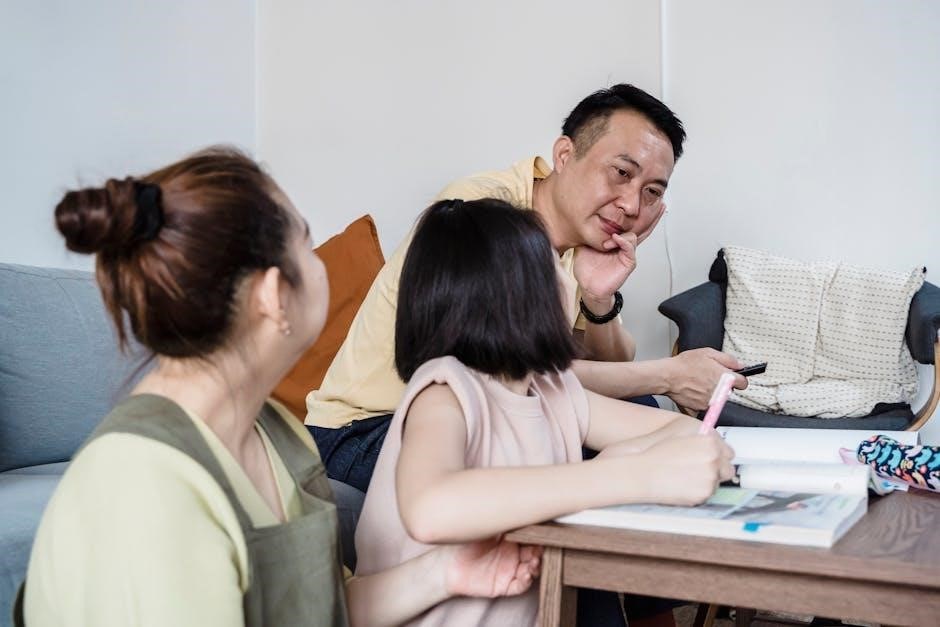
-
By:
- cierra
- No comment
parents guide the interview
Understanding the Interview’s Purpose
Understanding the interview’s purpose is crucial for parents to guide their child effectively. It’s a two-way conversation where both parties assess fit and alignment of expectations.
Why Interviews Are Important for Children
Interviews are vital for children as they foster confidence, clarity in communication, and self-expression. They provide an opportunity for children to articulate their thoughts and experiences, helping them develop essential life skills. Interviews also allow children to understand others’ perspectives and expectations, preparing them for future interactions. By participating in interviews, children learn to present themselves effectively, which is crucial for academic, social, and professional growth. This experience helps build resilience and prepares them to navigate challenges with confidence and poise.
Common Themes in Child Interviews
Common themes in child interviews often revolve around their interests, school experiences, and personal achievements. Questions may focus on hobbies, favorite subjects, and friendships. Interviewers also explore a child’s goals, challenges they’ve faced, and how they overcame them. Additionally, discussions about family involvement in their education and extracurricular activities frequently arise. Understanding these themes helps parents guide their child to prepare thoughtful responses, ensuring they feel confident and articulate during the interview process.

Preparing for Common Interview Questions
Preparing for common interview questions involves practicing with family or friends, using mirrors to rehearse responses, and organizing thoughts clearly to ensure confident and articulate answers.
Practicing Responses to Frequently Asked Questions
Practicing responses to common interview questions helps children feel confident and prepared. Encourage mock interviews with family or friends, using sample questions like “What inspired you to pursue this?” or “What are your strengths?” Use mirrors to observe body language and expressions, ensuring clarity and confidence in their answers. Teach them to organize their thoughts before responding, emphasizing the importance of clear communication. This practice not only builds confidence but also helps them enjoy the process of sharing their ideas and experiences.
Helping Your Child Ask Questions to the Interviewer
Encourage your child to prepare thoughtful questions for the interviewer, such as “What inspired you to pursue this?” or “What do you think are the most important qualities for this role?” Teaching them to ask insightful questions demonstrates curiosity and initiative. Guide them to think about their interests and goals, helping them craft questions that show genuine interest in the opportunity. This not only engages the interviewer but also helps your child feel more confident and involved in the conversation.
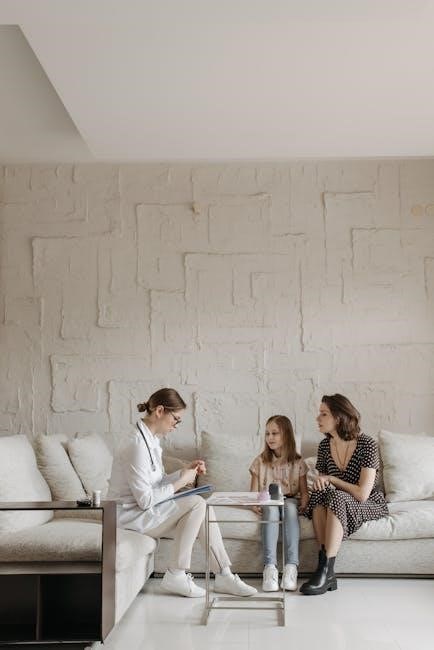
Rehearsing for the Big Day
Rehearsing the interview process helps build confidence and readiness. Practice with mock interviews, focusing on common questions and responses, to ensure your child feels prepared and poised.
Conducting Mock Interviews at Home
Conducting mock interviews at home is a great way to prepare your child. Create a realistic setting and ask common interview questions, encouraging your child to practice their responses. Use family members or friends to simulate the experience, and provide constructive feedback. This helps build confidence, improves communication skills, and reduces nervousness. Encourage your child to think aloud and explain their thoughts clearly. Make it engaging by incorporating role-playing and positive reinforcement to ensure they feel ready for the actual interview.
Using Mirrors to Improve Presentation Skills
Using mirrors can help your child improve their presentation skills. Encourage them to stand in front of a mirror while practicing their interview answers. This allows them to observe their facial expressions, body language, and gestures. Suggest they pretend to explain their thoughts to a younger sibling, making their communication clearer and more engaging. Recording these sessions can also provide valuable feedback, helping your child refine their delivery and build confidence for the actual interview.

The Importance of Body Language and Tone
Body language and tone convey confidence and enthusiasm. Ensure your child practices maintaining eye contact, smiling, and using open gestures. A calm and clear voice enhances their message.
Teaching Non-Verbal Communication Skills
Teach your child the power of non-verbal cues like eye contact, posture, and gestures. Practice in front of a mirror to ensure they maintain open and confident body language. Use video recordings to review and improve their expressions and movements. Encourage smiling and avoid fidgeting or crossing arms, which can signal nervousness. Role-play scenarios to help them understand how posture and facial expressions impact first impressions. Positive reinforcement will help them feel more comfortable and confident during the interview.
Role of Voice Modulation in Interviews
Voice modulation is key to making a strong impression. Encourage your child to speak clearly, vary pitch, and use a confident tone. Practicing voice exercises can help them project enthusiasm and sincerity. Remind them to avoid monotony and maintain a natural flow. Recording and reviewing their voice can highlight areas for improvement. Teach them to adjust volume and pace for emphasis, ensuring their message is engaging and memorable, especially in phone interviews where voice is the primary tool for communication.
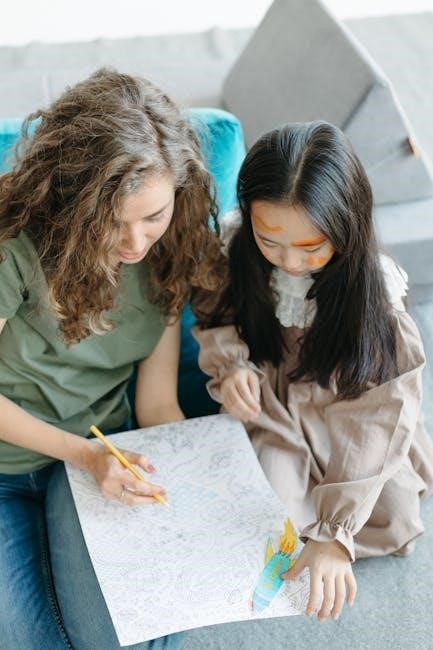
Dressing the Part
Dressing the part is vital for making a good first impression. Help your child select clean, appropriate attire that reflects the interview’s nature, boosting their confidence.
Choosing Appropriate Attire for the Interview
Help your child choose attire that aligns with the interview setting. For academic interviews, opt for neat, modest clothing. For professional settings, encourage business casual wear. Ensure clothes are clean, ironed, and fit well. Avoid flashy accessories or bold patterns that may distract. Comfort is key, as it boosts confidence. Guide your child to select outfits that reflect their personality while maintaining professionalism. Involve them in the decision to help them feel prepared and empowered for the occasion.
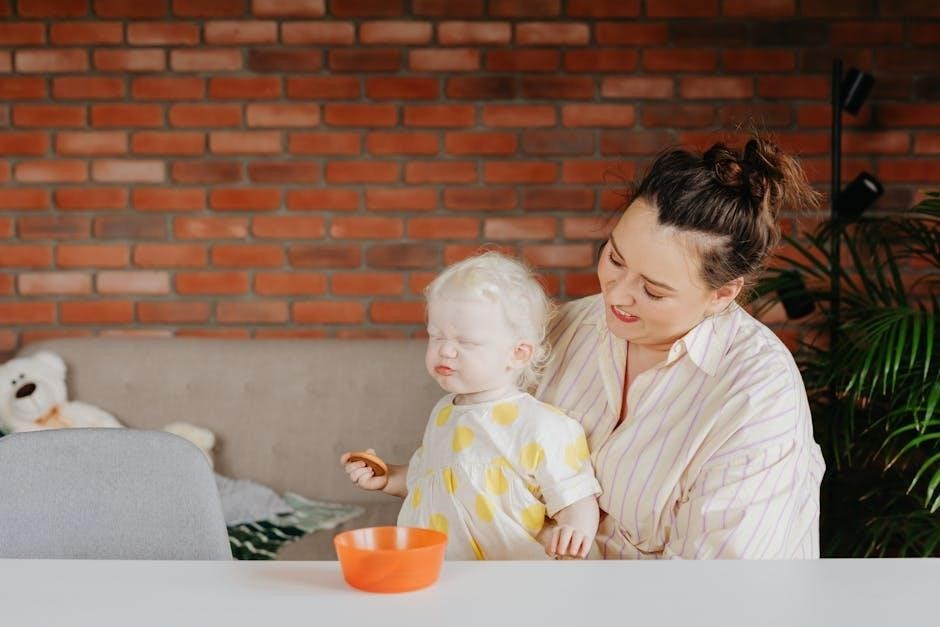
Handling Interview Day Nerves
Interview day nerves are natural. Encourage your child to take deep breaths, stay positive, and focus on their preparation. Remind them it’s okay to feel nervous.
Calming Pre-Interview Jitters in Children
Help your child manage pre-interview nerves by encouraging deep breathing exercises and positive visualization. Reassure them that it’s okay to feel nervous and that preparation will help build confidence. Discuss their concerns openly and remind them of their strengths. Encourage a growth mindset, focusing on learning from the experience rather than perfection. Remind them to stay calm, listen carefully, and respond thoughtfully. A supportive attitude and positive reinforcement can ease their anxiety and help them approach the interview with confidence.
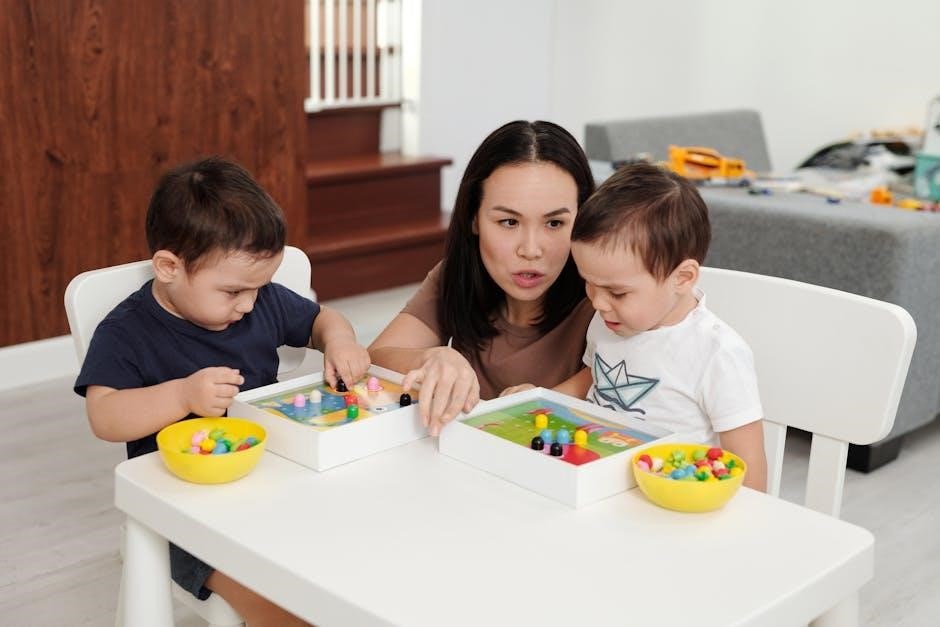
Special Considerations for Different Interviews
Different interviews, like in-person or virtual, require tailored preparation. Understand the format and adjust strategies to ensure your child is ready for any setting or platform.
Preparing for Phone Interviews
Phone interviews require unique preparation. Ensure your child speaks clearly and confidently, as voice is the only tool for communication. Choose a quiet environment and use a landline for better reception. Role-play the call, focusing on tone and pace. Teach your child to stand or sit upright to project their voice effectively. Encourage them to rehearse answers in front of a mirror to build confidence. Minimize distractions and ensure they stay focused during the call. Remind them to listen carefully and respond thoughtfully.
Final Tips for Parents
Keep the process positive and fun, focusing on effort over perfection; Encourage your child to embrace the experience and share their thoughts confidently.
Making the Experience Enjoyable for Your Child
Focus on creating a positive and stress-free environment for your child. Emphasize the enjoyment of sharing their thoughts and experiences. Encourage them to view the interview as an exciting opportunity to showcase their personality and skills. Practice responses in a relaxed setting, using positive reinforcement to build confidence. Remind them it’s okay to make mistakes—it’s all part of learning and growing. By fostering a joyful attitude, you’ll help your child approach the interview with enthusiasm and curiosity.
Guiding your child through interviews requires preparation, patience, and positivity. By fostering confidence and a growth mindset, you’ll help them navigate interviews successfully and build lasting skills.
Summarizing Key Points
To help your child succeed in interviews, focus on preparation, confidence-building, and clear communication. Practice common questions, encourage thoughtful answers, and teach effective body language. Dressing appropriately and staying calm under pressure are also vital. Foster a positive mindset, allowing your child to enjoy the experience while learning valuable life skills. By guiding them with patience and support, you’ll empower your child to approach interviews with confidence and poise, no matter the setting or type of interview they face.